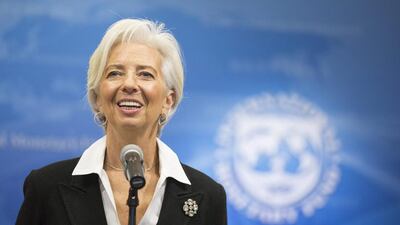Taxes are a hotly debated subject in this part of the world, which is known – and openly envied – by taxpayers elsewhere as the hallowed place where the government does not siphon off any part of one's earnings. So the prospect of introducing taxes, as IMF managing director Christine Lagarde has urged Gulf countries to do, understandably commands considerable attention.
The basis for the no-tax regime in the UAE and the other GCC countries is hardly rocket science: oil revenues have been sufficient to pay for government expenses without requiring workers to contribute. In defiance of Benjamin Franklin’s aphorism that the only certainties of life are death and taxes, the absence of income and consumption taxes has served the Gulf economies well.
However, Ms Lagarde makes an important point, particularly when a protracted period of low oil prices has led to most GCC countries to run deficits. Restricting expenditure while broadening the sources of government revenue will set up Gulf economies for a more sustainable future, particularly if combined with liberalisation measures and reducing subsidies on water and electricity.
The GCC has apparently accepted as much, and may introduce a Value Added Tax across all six countries, although it is not projected to take effect until at least 2018 and the rate – variously postulated at 3 to 5 per cent – is still to be determined. Subsidies on items like petrol and utilities have already been either eliminated or reduced.
The reality, of course, is the UAE already has some taxes and user-pays policies. Go to a hotel for dinner, for example, and the bill will be boosted by a 6 per cent tourism tax. Cars using Sheikh Zayed Road in Dubai will have money deducted from their Salik accounts.
Although the idea of a VAT may already be in train, what concerns some is whether this will lead to an income tax. Yet, there are, actually, other options. For instance, a levy on expatriate visas might raise funds while encouraging the private sector to more quickly Emiratise. But more fundamentally, it must be kept in mind that as we transition away from oil – the income from which goes directly to the government – economic diversification means the private sector will become larger and the income it generates not directly attributable to the government. This means a mechanism is needed for the state to gain a share of such bounty as its prudent policies have allowed private companies to reap. Exactly how to do this will be the challenge for policymakers.

